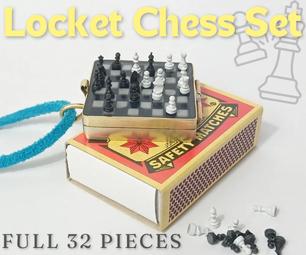Introduction: Damascus Steel and Silver Spinner Ring
How I made a spinner ring with silver and Damascus steel. This awesome ring is an enigma and the process is very cool. If you're looking for satisfying silversmithing delivered with a soothing Welsh accent then this video is for you!
Interested in taking one of my rings home? Find my new shop here:
Download my FREE "Guide To Making Bent Wood Rings" here:
Learn more about ring making on my course "Next Level Wooden Rings":
What is a spinner ring I hear you ask? Well it's a type of ring with a moving element that allows you to play or fidget with it. Some people say they help with anxiety, others just like having something to occupy their fingers (the devil makes work for idle hands!).
Typically spinner rings are made with precious metals like silver or gold and require a fair amount of skill to produce by hand. For this piece I used sterling silver sheet and wire to create the core, and then made a Damascus steel ring as the captive spinner.
This silver spinner ring has a lovely kinetic action as the spinning Damascus steel ring moves freely. The combination of contrasting materials and finishes also makes the piece both tactile and unique.
Supplies
Stainless Damascus Steel round bar:
https://ringsupplies.com/collections/bar-stock/products/stainless-damascus-patterned-bar-stock-28mm-round-bar
Silver sheet 0.8mm:
https://www.cooksongold.com/Sheet/Sterling-Silver-Sheet-0.80mm-Fully-Annealed,-100-Recycled-Silver-prcode-CSA-080
Square silver wire 1.5mm:
https://www.cooksongold.com/Wire/Sterling-Silver-Round-Wire-1.50mm--Fully-Annealed,-100-Recycled------Silver-prcode-HSA-150
Step 1: Measuring Up How Much Silver to Use
In the beginning there was maths ... yep the first step was to determine how much sheet silver to use to form the inside of the ring.
To do this I measured my finger with a ring sizing tool (determining it was about a size 10). Then I took a digital caliper and measured the diameter of a size 10 on a ring mandrel. You can also use the chart at www.ringsizes.co to get the diameter of any ring size.
Next I used the following equation to determine the length of silver I needed to form the inside of the ring:
(Diameter of ring size + Thickness of the metal) x Pi
So ...
19.84mm+0.8mm = 20.64mm
20.64 x Pi (3.143) = 64.87mm
(Sorry if this number differs from the one shown in the video, I may have measured slightly differently to get a different length but this is the formula to use).
Once I had determined how much silver to cut I took a piece of 0.8mm sheet that was pre-cut to 10mm wide, scored a mark at the 64.87mm mark and set up to saw the piece out.
Resting the piece of silver over a notch on my bench peg I used a jewellers saw to cut the piece off. Then I used a flat file to true up the edge I had just cut so it was at a 90 degree angle (or as close as I could humanly get it anyway).
Then I had the pleasure of peeling the plastic off the silver and I was ready to turn it into a ring!
Step 2: Bend It and Send It
It was time to bend the edges of the silver sheet so that they were touching. To do this I used my huge crushing strength to bend the piece around a socket to form a U shape, then manipulated the ends with my hands (or you can use a pliers) until the piece was more tear drop shaped.
Then I used a rawhide mallet to tap the ends down until they were touching. To get a nice, tight seam I manipulated the ends with a pliers until I had a nice D shaped piece of silver.
Step 3: Soldering the Inner Band
This is where the fun started - it was time to solder!
I began my mixing some flux with a borax dish & cone until I had a nice thick goop. I applied a liberal amount of flux to the join of the ring and then heated it with a torch to caramelise it.
The flux/borate goes quite fluffy when it's heated up so I like to caramelise it before applying the solder as I find it easier to control.
As this was the first seam of the ring I used a Hard silver solder. I cut 2 little pieces/pallions of solder and position the ring so that the join was directly over them.
I heated the piece evenly with a blowtorch and when it came up to temperature the solder flowed directly into the join via a capillary action. Very satisfying!
Step 4: Post Solder Pickle
After soldering the silver was oxidised and covered in excess flux. To clean all of this off I used a mild acid solution known as "Pickle".
To create a pickling solution you simply mix the crystals with hot water as per the instructions on the tub and place the piece of solder into he mix. It is usually cleaned up in 10-25 minutes.
I like to keep my pickle warm by mixing it in a cheap slow cooker. For this project there was a lot of soldering to do so I knew I'd need it again later and the pickle doesn't seem to work when it is not hot.
Step 5: Making It Round
After a decent pickling it was time to form the piece into a ring shape. First I used a sanding drum on my rotary tool and a file to sand/clean up the join on the inside of the ring.
I find it easier to clean up the inside when the ring is D shaped than when it is fully round. I've also found that this helps to prolong the life of my metal mandrels as chunks of solder/uneven surfaces can leave dinks in them when the ring is being hammered.
With the surface on the inside nice and even it was time to make the ring round. To do this I slid it on to a metal mandrel/tribet and hit it with a rawhide hammer until it was the shape I wanted.
To ensure it was evenly sized I frequently took it off the mandrel and flipped it over (the mandrel is tapered so best to do this instead of ending up with one side bigger than the other).
To clean up the join on the outside of the ring I used a no.2 and no.4 file.
After hammering to ring around the mandrel I used a ring stretcher to gently bring it up close to a size 10.
Step 6: Making the Silver Collars
With the inner ring made I was able to measure the outer diameter to determine how much wire I'd need to use for the collars.
I used the same formula as described earlier to cut 2 pieces of 1.5mm square silver wire (this time with my trusty wire cutters).
Creating these rings was pretty much the same process as the previous wider band. I bent them to shape, soldered with hard solder, pickled them, filed the insides, hammered them around a mandrel and filed the outer seam.
After the metal mandrel these rings were pretty wonky so I used a rawhide mallet to smush them flat.
I made these rings slightly under size so that I could expand them gradually to be a perfect, tight fit around the wider, inner band from earlier.
The ring stretcher proved very useful on this project for that exact purpose. After stretching the rings out they were a perfect fit!
Step 7: Machining the Damascus Steel Spinner
I used the measurement from the outer diameter of the first, wide silver band to determine how big to make the Damascus spinner.
(Full disclosure I can't remember what that was but it was likely around 21.44mm).
I didn't want the spinner to be too tight as then it wouldn't spin so I added 0.5mm to the required inner diameter and began machining (so I aimed to make it around 21.94 - 22mm).
To make the initial hole in the Damascus steel round bar I used progressively wider HSS drill bits (5mm, 10mm, 15mm, 18mm, 20mm). It is best to drill steel slowly with lots of cutting fluid so I made sure the lathe was running at about 270-230 rpm.
When the hole was drilled up to my biggest drill bit I used a carbide boring tool to expand the inner diameter of the ring on the lathe.
After the inner diameter was done I used a different carbide cutting tool to shape the outer diameter of the ring. I wanted a nice surface finish on the steel so I used a fresh, sharp carbide tip and ran the lathe pretty fast with a slow feed (about 550-600rpm).
The surface finish was pretty nice and when I had the right outer diameter (around 25mm) I used a parting off tool to cut a 6mm length of the round bar off.
Step 8: Etching the Damascus
To get the Damascus ring ready to etch I sanded it with a few grits of fine wet and dry (240, 400, 600, 1200) until there were no obvious tool marks or scratches on the piece.
I polished the outside of the Damascus ring with Tripoli compound using a nylon brush head on the rotary tool. This brought up a beautiful finish. The ring was then thoroughly cleaned and blasted in an ultrasonic cleaner before being sent to the acid bath.
The acid I used was Ferric Chloride which I heated in a make shift bain-marie with the slow cooker. I lowered the piece in and left it for 25 minutes.
Damascus steel is made by fusing two steel alloys (316 and 304 steels in this case) then twisting and hammering them to form interesting patterns. While machining the steel it looks like any other metal but when the piece is left in acid one alloy is eaten away faster than the other to reveal the pattern. Pretty magical!
Step 9: Soldering All the Pieces Together
Finally it was time to assemble all 4 of the pieces! Before going anywhere near this piece with a blowtorch I made sure that the collars were a perfect tight fit and that the captive Damascus band had plenty of space to spin.
I started by slotting one of the collars on to the core, applied a thick flux and heated it with the torch until it had all died down. Then I added pallions of Easy/Soft silver solder to the edge.
The piece was then heated evenly until the solder ran into the join and the first collar was attached.
After a thorough clean in the pickle I slotted the Damascus ring on and position the second collar so the spinner could move freely.
The soldering process was repeated and the ring was fully assembled!
Step 10: Finishing
Final shaping was done using files and sanding rolls on the rotary tool. The inside and outside edges were slightly tapered using a file and elbow grease. I sanded and filed every surface of the ring so that they were smooth and free of scratches.
I wanted the silver parts of the ring to have a brushed finish and for that I used a Scotchbrite disk on the rotary tool.
The Damascus part was then polished with a green polishing compound until it was gleaming, nicely contrasting the brushed silver.
The last thing to do was to clean the ring thoroughly with soap/water/ultrasonic vibrations and take some snazzy photos!
Step 11: Take Snazzy Photos and Enjoy!
This has to be one of my favourite rings I've ever made! The spinning action is perfect and the finish is beautiful.
Interested in taking one of my rings home? Find my new shop here:
Download my FREE "Guide To Making Bent Wood Rings" here:
Learn more about ring making on my course "Next Level Wooden Rings":
See you in the next one!

Second Prize in the
Metal Contest











